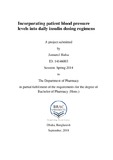Incorporating patient blood pressure levels into daily insulin dosing regimens

View/Open
Date
2018-09Publisher
BRAC UniversityAuthor
Hafsa, JannatulMetadata
Show full item recordAbstract
There has been an expansion in the commonness of diabetes mellitus in the course of recent years. There has also been additionally extensive confirmation for an expanded predominance of hypertension in diabetic people. Both hypertension and diabetes that have inclined to the improvement of cardiovascular diseases (CVD) and renal disease. Subjects having diabetes are at around 60% expanded danger of early mortality. The nearness of hypertension in diabetic patients considerably has built and enhance the dangers of coronary heart disease, stroke, nephropathy and retinopathy. Epidemiologic examinations which give confirmation to concurrence of hypertension and diabetes and perhaps point towards a typical hereditary and natural factor advancing both diabetes and hypertension. The connection amongst diabetes and hypertension get fueled by 2 particular observations where the one that was nonattendance of successful antihypertensive medications but this has been changed because new medications have been produced for the better care of the patient and the other one which was the insulin resistance that is currently one of the main considerations adding to hypertension. The basic pathways by which diabetes and hypertension often happen together is incorporated by- obesity, inflammation, oxidative stress and insulin resistance. Insulin resistance, expanded tissue inflammation and reactive oxygen species (ROS) generation that brings about endothelial dysfunction, expanded tissue renin-angiotensin-aldosterone framework (RAAS) and expanded sympathetic nervous system (SNS) action have all been involving in this complex pathophysiology of diabetes and hypertension. Again, the reason for high blood pressure with diabetes is because high blood sugar levels damage the blood vessels and cause cholesterol abnormalities which is common for people with type 2 diabetes. Type 2 diabetes causes high blood pressure because high insulin levels stimulate the nervous system which then speeds up the heart and makes blood vessels narrower causing blood pressure to increase arteries carry blood from heart and it is the force of the blood pushing against the artery walls. The damage caused from this force on artery walls can cause them to get more narrow and the end result of this is heart attack or stroke. The aim of this study is to adjust the total daily insulin dosage for the patients who are already on an insulin treatment regimen by using a fuzzy-based system.
